GRANTMAKING
BAF follows an inclusive and participatory grantmaking process to provide resources to collaborations and initiatives that advance sustainable food systems rooted in agroecology.
Steps involved in BAF’s grantmaking process

GUIDELINES
- Executive Committee (EC) and Advisory Board (AB) identify strategic priorities and focus areas
- BAF team creates timelines and guidelines
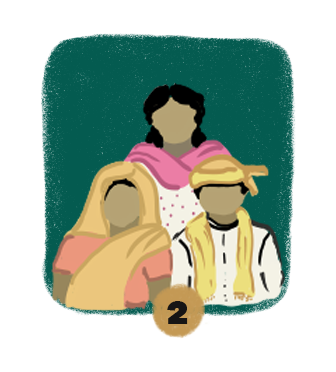
NOMINATIONS
- Advisors and BAF members scout and nominate collaboratives and initiatives
- BAF team complies a docket for evaluation
- Advisors shortlist nominations for the final round

PROPOSALS
- Selected nominations requested for full proposal
- BAF team compiles a docket for evaluation
- Advisors recommend shortlisted proposals to EC for review
- Consultation with funders on the recommended list
- EC/AB recommends the final list to PMU

FUNDS RELEASE
- PMU conducts due diligence
- PMU releases funds
- BAF team tracks for spend and implementation status
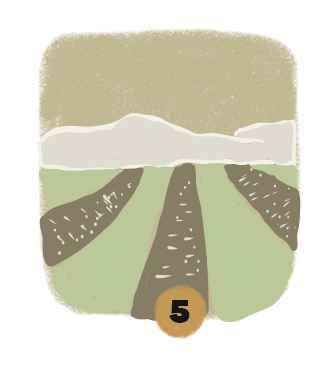
MEL
- Monitoring Evaluation and Learning phase is characterised by regular meetings with grantees
- Cross-learning events
HOW WE WORK
The Executive Committee is BAF’s apex governing body and is comprised of two advisors, two donors, one representative from the Project Management Unit (PMU), and two grantees. Grantees serving the Executive Committee do not participate in grant recommendations and related matters. The Executive Committee supports staff in their day-to-day operations and decides on strategies and other matters related to grants. The Executive Committee is responsible for conflict resolution and has the authority to make decisions on various matters regarding BAF’s operations.
The Advisory Board is an independent group comprised of nine advisors. Their role is to help guide the Agroecology Fund in its overall strategy and lead the grantmaking process. They also support the design of grantmaking strategies, deciding on thematic priority areas, etc. One advisor from India also serves on the global Agroecology Fund’s advisory board.
The Bharatiya Vikas Trust (BVT) is BAF’s Project Management Unit, responsible for matters including legal compliance and due diligence.
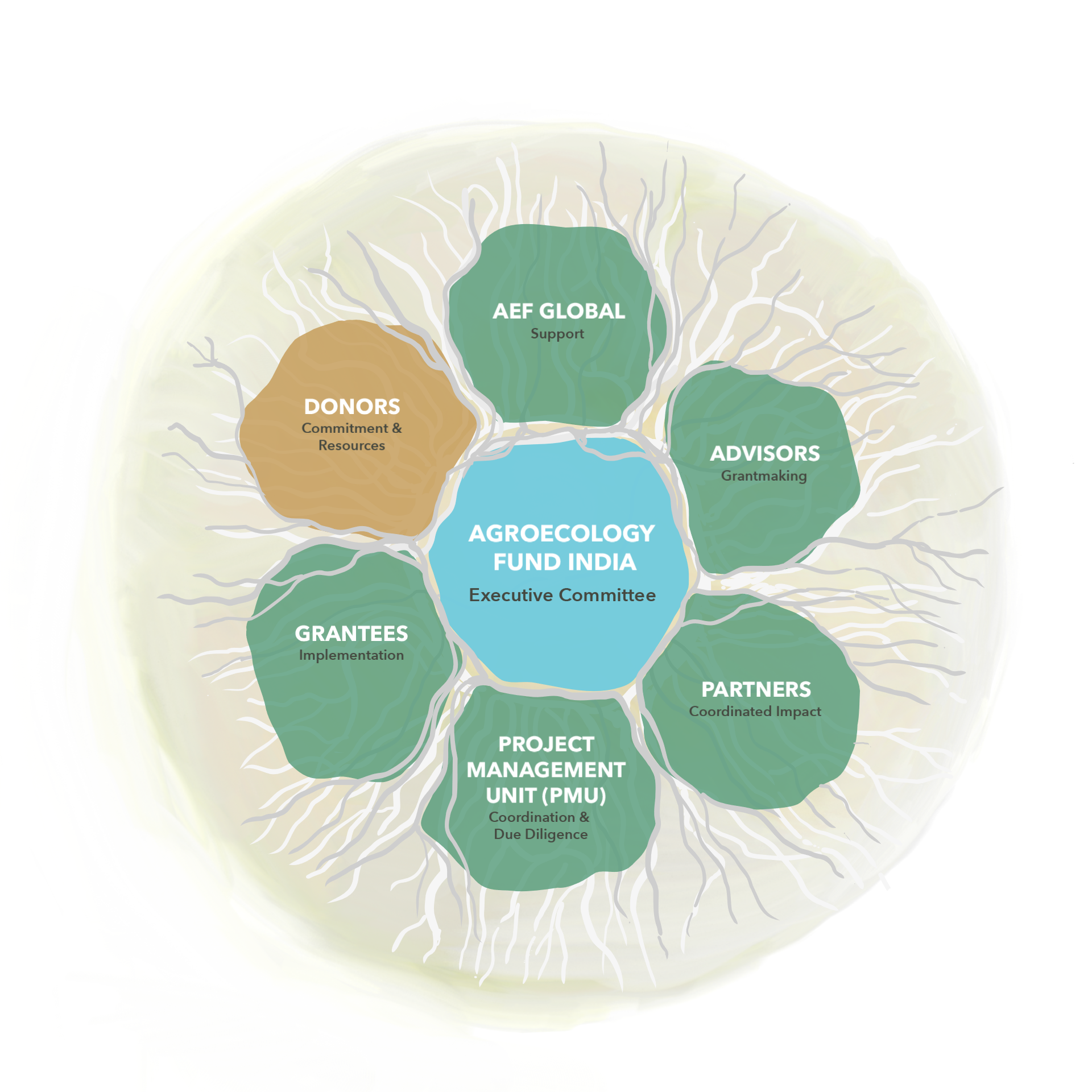
HOW WE WORK

The Executive Committee is BAF’s apex governing body and is comprised of two advisors, two donors, one representative from the Project Management Unit (PMU), and two grantees. Grantees serving the Executive Committee do not participate in grant recommendations and related matters. The Executive Committee supports staff in their day-to-day operations and decides on strategies and other matters related to grants. The Executive Committee is responsible for conflict resolution and has the authority to make decisions on various matters regarding BAF’s operations.
The Advisory Board is an independent group comprised of nine advisors. Their role is to help guide the Agroecology Fund in its overall strategy and lead the grantmaking process. They also support the design of grantmaking strategies, deciding on thematic priority areas, etc. One advisor from India also serves on the global Agroecology Fund’s advisory board.
The Bharatiya Vikas Trust (BVT) is BAF’s Project Management Unit, responsible for matters including legal compliance and due diligence.
EXECUTIVE COMMITTEE
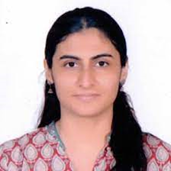
Huda Jaffer
Huda Jaffer, Director, SELCO Foundation, is a product-service-system designer. She has an undergraduate degree in design. She also has a Master of Science in Engineering and Business from the Massachusetts Institute of Technology, Cambridge. Developing user-centric designs for sustainability and developmental issues interests her. She has been critical in building the necessary processes of the SELCO Foundation that have led to it being known as a pioneer in the field of building the ecosystem for sustainable energy access for the poor.
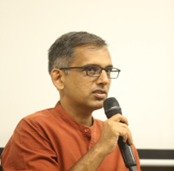
Sameer Shishodia
Sameer Shisodia, Chief Executive Director at the Rainmatter Foundation. He leads various developing projects of the foundation and building funding and investment programs, among many other things. He left his long career in the tech industry a decade ago. He partly moved to Coorg to experiment with sustainable farming, farm collectives, and his passion for rejuvenating soil and forests.

Sreedevi Lakshmi Kutty
Devi has worked on sustainable food solutions and organic/sustainable farming since 2005. She has been part of the Save Our Rice Campaign since 2008 and other initiatives and is passionate about promoting agro-biodiversity conservation through diverse foods. She is co-founder of Bio Basics, a social venture promoting and retailing organic food and curating indigenous grains.

Nachiket Udupa
Nachiket Udupa is a member of the Mazdoor Kisan Shakti Sangathan (MKSS), a non-party political organisation that works with labourers and peasants in the villages of central Rajasthan. He represents the MKSS in the Steering Group of the Alliance for Sustainable and Holistic Agriculture (ASHA) – Kisan Swaraj, where he primarily engages with issues around digitalisation in agriculture.

Shloka Nath
Shloka has a Master’s in Public Policy from Harvard’s Kennedy School of Government and a BSc in Government from The London School of Economics and Political Science. Shloka Nath currently leads the Policy and Advocacy and Sustainability portfolio at the Tata Trusts, one of India’s leading philanthropic foundations. She is also the CEO of the India Climate Collaborative (ICC), an India-led platform founded in 2018 by a group of philanthropies interested in continuing to accelerate India’s development while also exceeding its climate goals. She has spent over a decade in journalism with the BBC in London, as a news anchor with New Delhi Television (NDTV) and Principal Correspondent with Forbes in Mumbai.
ADVISORY BOARD

Ishteyaque Ahmad
Ishteyaque Ahmad is a sustainable agriculture campaigner. He has been working with small and marginal farmers for over 25 years.

Kapil Shah
Kapil Shah has been promoting organic farming since 1985 through his voluntary organisation - JATAN. He has an MSc in plant breeding and genetics and has been active in resisting GM crops and ensuring seed rights for farmers.

Manjushree Tadavalkar
Manjushree under the aegis of Know How Foundation, Co-founded the Institute of Natural Organic Agriculture [INORA]. She is passionate and has extensive expertise in soil biology, earthworm biotechnology, composting science, agrosystems, and bio-input manufacturing. She also works with different farmer groups or farmer-producer organisations (FPOs) to support other activities, organic certification, etc.

Nachiket Udupa
Nachiket Udupa is a member of the Mazdoor Kisan Shakti Sangathan (MKSS), a non-party political organisation that works with labourers and peasants in the villages of central Rajasthan. He represents the MKSS in the Steering Group of the Alliance for Sustainable and Holistic Agriculture (ASHA) – Kisan Swaraj, where he primarily engages with issues around digitalisation in agriculture.

Prof Shambhu Prasad
Prof. Shambu Prasad is a Strategic Management and Social Sciences professor at IRMA. His expertise and research straddle several interdisciplinary fields, such as science and technology studies, rural livelihoods, social entrepreneurship and innovations, sustainable agriculture and managing collectives enterprises. He coordinates a project on "Living Farm Incomes: Civic Action, Equity and Sustainability" and works on managing sustainable transitions. He has edited two volumes on "Farming Futures", comprising of 15 detailed case studies on social enterprises (published) and FPOs (forthcoming) in India.

Shirish Joshi
Shirish Joshi has been assisting NGOs in developing FPOs with appropriate business models, especially in rainfed areas.
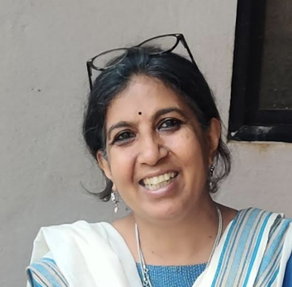
Sreedevi Lakshmi Kutty
Devi has worked on sustainable food solutions and organic/sustainable farming since 2005. She has been part of the Save Our Rice Campaign since 2008 and other initiatives and is passionate about promoting agro-biodiversity conservation through diverse foods. She is co-founder of Bio Basics, a social venture promoting and retailing organic food and curating indigenous grains.

Tamara Law Goswami
Tamara is an environmentalist with work experience spanning over two decades. She focuses on applying transdisciplinary learnings to environment and development issues in Northeast India.

